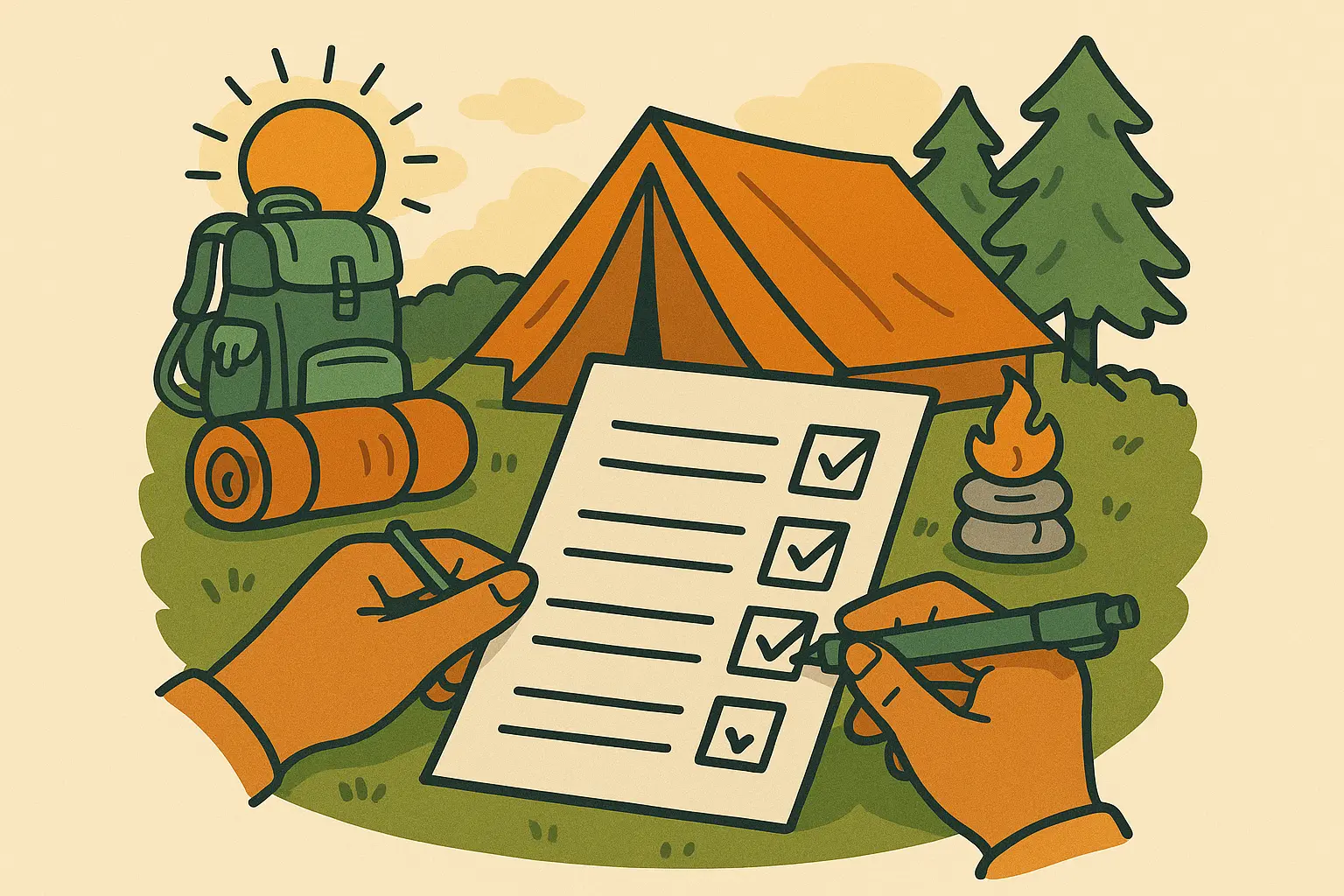Family Camping Checklist: What to Pack and Prepare
One hot summer evening, we pulled into our campsite, set up our tent, laid out out sleeping bags, and that’s when we discovered…we forgot our pillows. Rookie move. So there I was, cramming clothes into stuff sacks and telling the kids it was a “camping adventure.” They weren’t buying it. And now this is a story we regularly retell at least three times a year.
If you’re new to family camping, this guide is for you. Don’t let what happened to me happen to you.
Packing doesn’t have to be overwhelming. You don’t have to buy every gadget they sell in REI or load your car like you’re heading off-grid for a month. Instead, start with just the essentials, add a few extra items, and build up to a set of gear of what works for your crew.
We organized this checklist by category: shelter, cooking, clothing, safety, and fun. In each section, we further divided the gear into four levels.
- Minimal Essentials: This is the gear you must take with you. If you don’t have these items you will NOT have a successful camping trip and your first trip might very well be your last.
- Helpful Extras: This section is for some small additional gear that can make a big difference in comfort and convenience. These items are not necessary. You will have a great time without these, but if you have room we highly recommend you take some of these.
- Experienced Camper Gear: This section is for items upgrades you can take with you once you’ve got a few trips under your belt. These things are not needed to enjoy camping and in the beginning could end up slowing down your adventure. However, once you have some experience with the simple things, these elevate your camping to a different level.
- Glamping Items: “Glamping” combines “glamorous” and “camping.” This gear brings luxury and fun into the equation. It’s like roughing it in style. None of this stuff is essential. It’s all about bringing the comforts of home with you. The drawback to these items is they are usually big, heavy, and awkward to carry. When you cross this line, your set up and packing time drastically increase. Many of these items we take with us when we are camping for extended periods. When we are going for just a night or two, we leave these things home. We have found it is not worth the time to set all of this up on Friday afternoon if we are packing it all up on Sunday morning. Once you have a few trip under your belt, decide if the extra hassle is worth the benefits.
Overall, we like to pack smart and keep it simple.
Before you Start to Pack
We ask these same four major areas of concern each time we start prepping for a family camping trip.
Where are we going?
Where we are camping has a big impact on what we can bring with us.
- If there are no electrical outlets, then we don’t take a fan or a heater.
- If we have access to a washer and dryer, then we can pack less clothes.
- If it is close to home, we can easily run back home and grab a luxury item if we want to.
- If we have to park far from our car, then we take a lot less stuff with us.
What activities are we planning?
What we are planning to do while we are camping dictates what gear we need to take with us. This means that some stuff gets left at home simply because we don’t have room for it. For example, we don’t have enough room to take kayaks and mountain bikes on the same trip. We have to decide which one of these we are doing before we leave.
- If we are going in the lake, then we take life vests, floaties, kayaks, etc.
- If we are hiking, then we take hiking poles, day packs, boots, etc.
- If we are mountain biking, we need helmets, gloves, extra water bottles, repair kits, etc.
What’s the weather going to be like?
We ALWAYS check the weather before we go. In fact, we start checking it about 2 weeks before a trip and then recheck it daily (or more often) up until we leave. Then we check it every morning at camp.
- If it is going to be cold, we know to take extra blankets and thick coats. Maybe a heater if we have electricity.
- If it is going to be hot, we take lighter sleeping bags or take a fan.
- If it is rainy or snowy, we can take extra tarps and large garbage bags to keep your stuff dry.
- If it is going to be windy, have extra paracord and stakes to keep your gear tied down.
How long are we staying?
This one really influences how much “extra” stuff we take with us.
- If we stay for one or two nights, we go minimal. For us, we don’t think it’s worth the hassle of setting up a ton of gear only to pack it up the next morning.
- If we are going to be camping for a week, then game on. I’m taking everything I can cram in our SUV and I may take the trailer as well.
Shelter & Sleep Setup
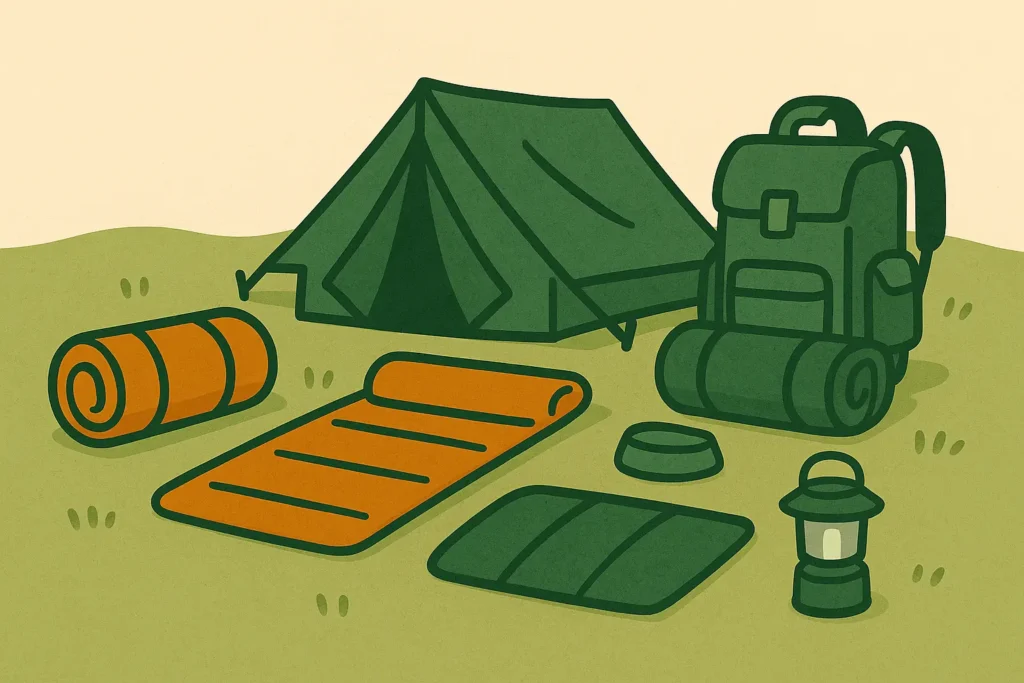
I cannot ever stress this enough. Getting good, quality sleep while camping is mission-critical. If your family is cold or wet, you will be incredibly uncomfortable. This will make you question your sanity and consider heading home early.
You don’t need an expensive tent and it doesn’t need to be fancy. It needs to be reliable. It needs to keep you dry and protected from the elements.
The same philosophy applies to your sleeping bag. You don’t need a $300 goose down sleeping bag (although they are nice and once you sleep in one nothing else will ever do.) You need a decent bag that is rated for your weather conditions.
I’ve said this before and I’ll say it until I’m blue in the face. You need a sleeping pad or mattress under your sleeping bag. These provide some cushioning between you and the ground. The older you get, the more you’ll appreciate this. More importantly, they provide insulation from the ground. You probably won’t believe me until you experience this, but the ground has an amazing ability to suck every bit of warmth out of your body leaving you curled up in the fetal position shivering for all your worth. A sleeping pad gives you a thermal break and keep you comfortable all night.
Take your pillow. ‘Nough said.
Let’s take a look at what keeps you dry, warm, and well-rested.
Minimal Essentials
- Tent, including a rainfly, stakes, and ground tarp or footprint)
- Sleeping bags appropriate for the season
- Sleeping pads or air mattresses
- Pillows
These items are non-negotiable. Forgot these and you are in BIG trouble. A bad night’s sleep will put everyone in a horrible mood the next day.
Have you ever been around your kids the day after they didn’t get enough sleep? Now picture that times two. That’s what you get when kids don’t get enough sleep when camping. I think it’s the combination of lack of sleep with an unfamiliar environment that turns them into little demons.
Helpful Extras
- Extra blankets
- Small broom and mat to keep dirt out of the tent
- Tent lantern
These little extras make your tent feel almost as cozy as your home. I definitely recommend squeezing these items in.
Taking a broom doesn’t sound exciting, but sweeping out dirt and leaves every day is a sanity-saver. All it takes is one time of a kid wearing their shoes in the tent to make you move the broom into the must have column.
TIP: Don’t wear shoes in the tent, EVER. We learned quickly to use a covered bin outside the tent door for shoes. Shoes NEVER go in our tent. I can tell you the entire campground will know if you wear shoes in my tent.
Experienced Camper Gear
- Sleeping bag liners (adds warmth and keeps bags cleaner)
- Camp cots for off-the-ground sleeping
- String lights or solar tent lighting for ambiance
After a few family camping trips, you’ll learn how your family likes to sleep. These extras will help with comfort and efficiency.
Sleeping bag liners are machine washable and will really cut down on how many times a year you have to clean your sleeping bags. Which can be a pain depending on what type of bag you have.
Camping cots are a game changer for lightweight comfort when you are sleeping. They are just as comfortable as an air mattress and you never have to worry about them deflating on you in the middle of the night.
Glamping Items
- Inflatable mattresses with frames
- Battery-powered fan or tent-safe heater
- Tent rugs or flooring
- Decorative pillows, hanging organizers
These items are the one that will make your camping trip Instagram worthy. They are not necessary at all. But if you’ve got the space and want to feel like you’re in a cozy cabin, go for it.
Cooking & Food
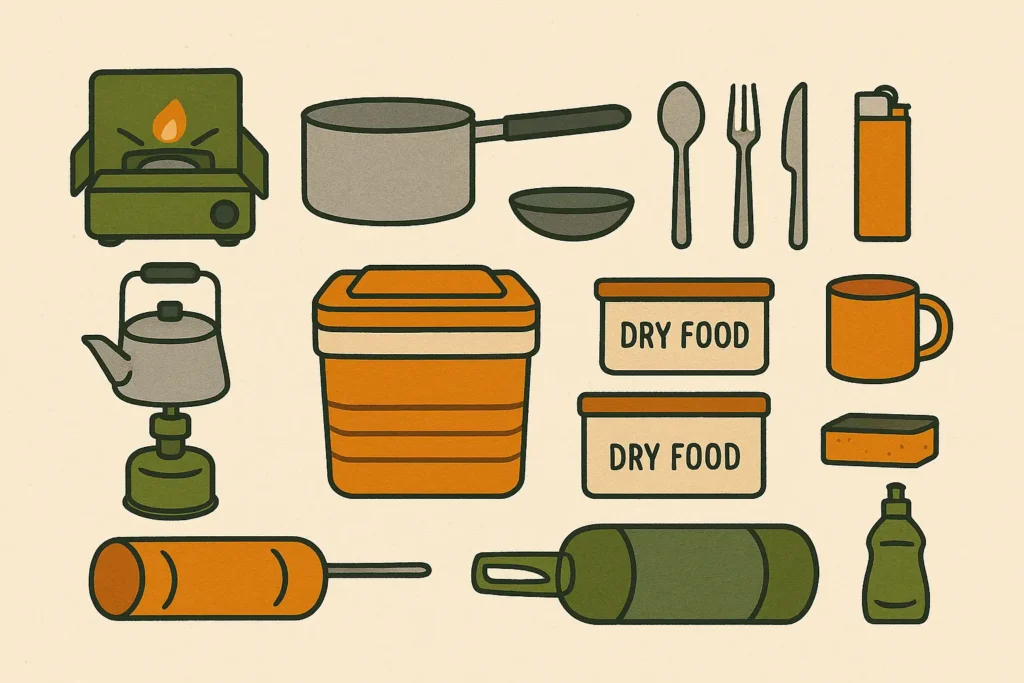
When you boil it down to the basics, camp food is half the reason kids love camping. From s’mores to cooking hot dogs over the fire to astronaut ice cream, camp meals are a big part of the experience.
Cooking outdoors doesn’t have to be complicated. Start simple with what you need to feed the crew, and expand from there.
Minimal Essentials
- Camp stove and fuel
- Lighter or matches
- Cooler with ice
- Water jugs or bottles
- Plates, cups, utensils, and basic cookware (pan, spatula)
- Simple meals and snacks
- Instant coffee
- Trash bags
This is your baseline setup. You need something to eat, a way to keep it cold, a way to heat it up, something to eat off of and with, something to drink, and somewhere for trash.
Make sure you have a way to make a hot cup of sanity juice…I mean coffee. You can thank me later.
TIP: Don’t depend on using the fire to cook all of your meals. It’s great when it works, but too many things can go wrong from rain to no firewood to make this your only source. Take a stove to cook over in case you can’t get the fire started.
Helpful Extras
- Dishwashing tub, sponge, biodegradable soap, drying towel
- Food storage bins or totes
- Tablecloth for picnic tables
- Camp chairs
These almost made the essential list. We take these everytime. But they are not essential, meaning you can have a very successful trip without these.
However, being able to wash dishes and keep the picnic table clean will make everything run smoother and be more hygienic. And that will make everyone feel better.
Experienced Camper Gear
- Coffee maker (percolator, French press, pour-over)
- Cutting board and sharp knife
- Two-burner stove or griddle
- Spice kit and cooking oils
These become more necessary the longer your trip is. They will help elevate you from hot dogs to real home cooked meals.
TIP: Coffee is important. Have a way to make coffee. Instant works in a pinch, but a french press doesn’t take up much room and requires no electricity. I promise you a good cup of coffee helps so much.
Glamping Items
- Dutch oven or cast iron skillet
- Folding camp kitchen table
- Reusable wine glasses and charcuterie boards
- Mini fridge or electric cooler (if power is available)
These are all totally optional and not worth it for a quick trip. But these can make camping a totally different experience. This can make it so much fun and elevates meal times to something special.
Clothing & Personal Items
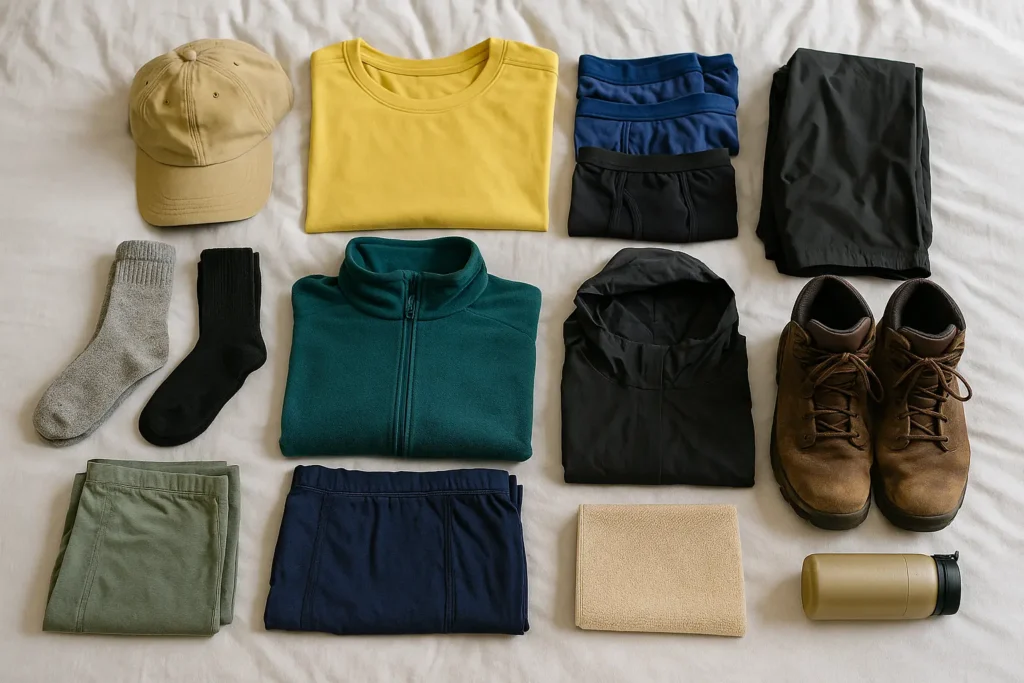
When you take your family camping, all of you will be right in the middle of everything. You will be exposed to all the elements. The sun, rain, wind, dirt, and bugs.
Having the right clothing and personal items keeps everyone in good spirits and healthy. Please don’t overpack, but you do need to be prepared for unpredictable weather and messy kids.
Minimal Essentials
- Clothing that can be layered
- Pajamas
- Extra socks and underwear
- Closed-toe shoes or hiking boots
- Toothbrush and toothpaste
- Sunscreen and bug spray
These cover all the basics. It covers protection from the weather, hygiene, and comfort. When we camp we take one outfit per day based on our planned activities.
I like to have everyone think in layers. We find it is easier to add a layer or take off a layer rather than completely change outfits. For example, we all bring sweat pants and a sweat shirt, no matter how warm it is. If we get chilly, we can quickly put these on over our clothes for a little more warmth.
Hygiene is important especially when camping. Take your toothbrush and toothpaste. Everyone needs to brush, especially after eating S’mores!
Helpful Extras
- Camp slippers or flip flops
- Quick-dry towels
- Hat for sun or warmth
- Hand sanitizer and wet wipes
- Dirty laundry bag or bin
These items are so useful, you will quickly depend on them. If you have the room, take them. Wet wipes alone will become your best friend.
Experienced Camper Gear
- Shower shoes (for campgrounds with facilities)
- Clothesline and clothespins
- Extra jacket or dedicated rain gear
- Scarfs or bandanas
As you gain more experience, you’ll figure out the patterns. You’ll learn what gets soaked, what doesn’t dry, and how to keep gear organized. As you learn these lessons, find gear that solves these problems and add it to your list.
None of this is essential, but when you need it, you will be grateful you have it.
TIP: I take all of these with us on most trips. It doesn’t mean it gets used, but it is nice to know it there if we need it. For example, I have a clothesline with integrated clips that is about 3 inches by 3 inches. We almost never use it, but there have been a time or two where our clothes got soaked by a surprise shower and it was a life saver to be able to hang them up to let them dry later in the sun.
Glamping Items
- Hanging toiletry organizer
- Travel mirror
- Full-size towel set
- Perfume/cologne, makeup, or skincare kit
These luxury items will make you feel pampered. They are totally unnecessary, but sometimes nice. We usually take a hanging toiletry organizer because it helps keep us organized, but we have never taken a full size towel set with us, not a single time.
Safety & First Aid
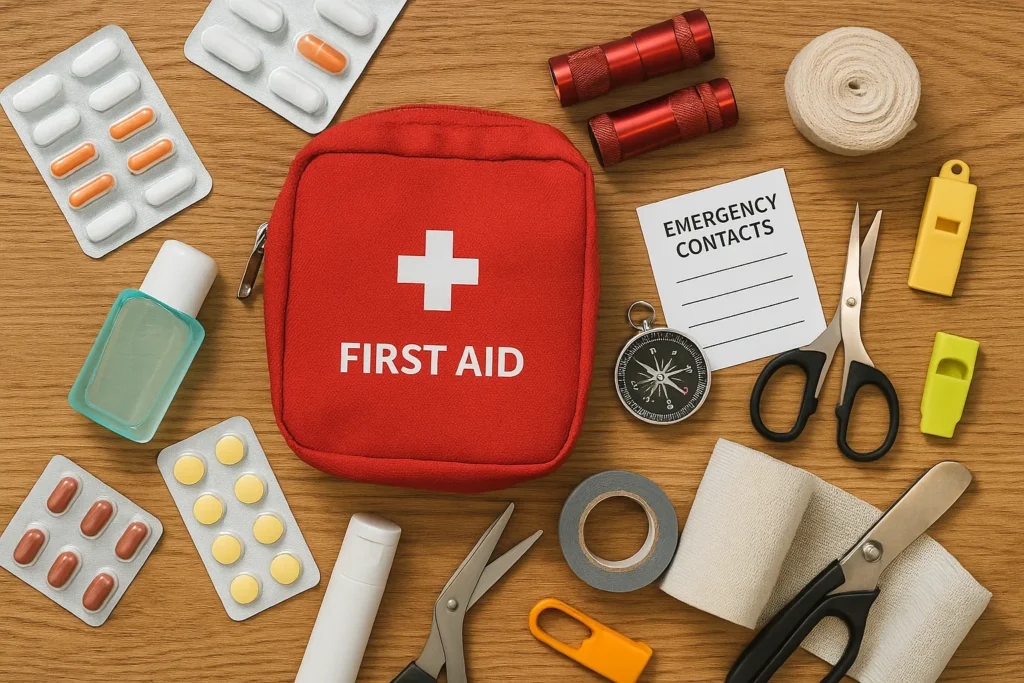
Camping is safe, but stuff happens. Almost every issue you will have will qualify as minor. Stuff like splinters, burns, scraped knees, and bug bites are par for the course. A basic safety setup helps you handle the small stuff and stay calm if bigger issues arise.
Minimal Essentials
- First aid kit (with bandages, antiseptic, meds)
- Flashlights or headlamps (one per person)
- Extra batteries
This is the bare minimum you need to stay safe and find your way around after dark, and handle basic injuries. Most problems you are going to have are mosquito bites, any bites, splinters, and small cuts. These items will cover all of those.
Helpful Extras
- Emergency contact list and map
- Duct tape (for everything from blisters to tent repairs)
- Compass or downloaded trail maps
- Multi-tool or small gear repair kit
These provide a little more to help keep everything under control. Duct tape really is a cure-all for so many problems. Make sure to have a roll. A multi-tool like a leatherman will be very useful and you will find yourself quickly depending on it. We have one that we keep with the camping gear. We never take it out at home. This way I know it is always with us and I don’t have to remember to pack it each time.
TIP: If you can afford it, by separate gear for camping. Keep it with your camping gear and don’t use it at home. This way you don’t have to find it each time you go camping. Just double check it’s there before each trip.
Experienced Camper Gear
- Emergency whistles (especially for kids)
- Walkie-talkies
- Portable power bank
- Backup fire starter (fire steel, waterproof matches)
I think you are catching on to my theme here. These are items you will use and be happy you have, but you don’t need these to have a great time camping. You’ll appreciate these once you’ve got a trip or two under your belt.
Glamping Items
- Mini generator or solar station
- Full-sized emergency radio or GPS locator
- Extra lanterns for mood and safety
- Mosquito-repelling gadgets
These are useful items. They are very useful if you’re off-grid in the backwoods or just like having backups for your backups. We invested in a small generator several years ago and it has turned out to be one of our best investments. Definitely not cheap, but it has become invaluable and makes every trip with us.
Fun & Activities
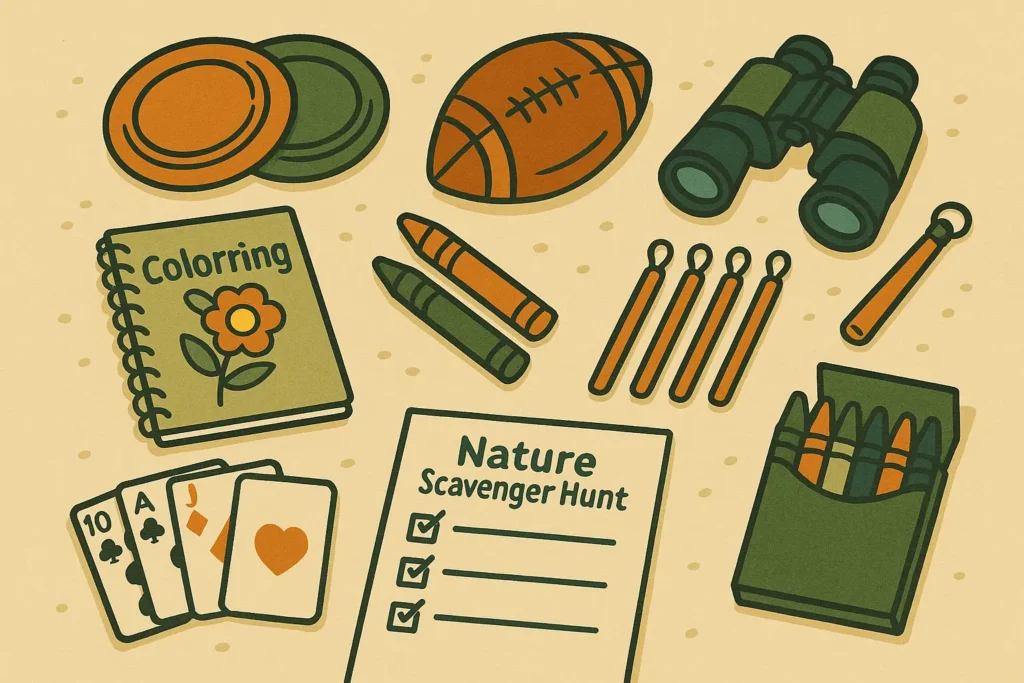
Don’t bring the entire toy box from home. Nature provides plenty to explore. But having a few go-to activities for quiet time, rainy days, or slow mornings can save your sanity and create some great memories.
When the kids were younger, we let them each bring one toy from home. Then we brought a couple more items,usually a game or craft type activity.
Minimal Essentials
- A deck of cards or travel size board game
- Coloring book and crayons
- Bedtime storybook
- Nature scavenger hunt list
This simple kit is enough to keep most kids entertained when they’re not chasing bugs or roasting marshmallows.
We always take a deck of cards with us. I would learn a new game for each trip and teach it to the kids. It could be as simple as war or as complicated as Shanghai Rummy.
We bought a magnetic chess / checkers set and took that along as well. Between this and the cards, we were almost never “bored.”
Helpful Extras
- Glow sticks (huge hit after dark)
- Bug catchers and magnifying glasses
- Binoculars
- Balls, frisbee, or kite
These really are dependent on your family and the ages of your kids. These are small items that can have a big impact on camp morale. You can never go wrong with glow sticks and a frisbee.
Experienced Camper Gear
- Hammock
- Star chart or stargazing app
- Small musical instruments (harmonica, ukulele)
- Nature journal or sketch pad
These are great for longer stays, older kids, or building nature habits. They will be dependant on your kids.
I can say from experience that hammocks are fantastic. One word of warning though, once you start with hammocks, you will quickly realize you will need one for each family member. We have even been on trips where at least one family member spent the entire night in a hammock.
Glamping Items
- Outdoor projector and sheet for movie night
- Kids’ cameras or instant photo printers
- Full arts and crafts kit
- Giant inflatable games
Many people, myself included, will consider these items way over the top for a camping trip. But if you’re camping for multiple nights or with a group, these can turn your site into a kid paradise.
Your site will quickly become the cool site where everyone wants to be. This could be good or bad depending.
Packing Tips for Families
- Pack by person for clothing and toiletries so each kid has their own bag
- Pack by category for shared gear (kitchen bin, lighting bin, first aid bin)
- Use clear plastic totes and label them
- Stack your vehicle what you need first (tent & kitchen) are on top and first out
- Create a reusable checklist that you update after each trip
- Get kids involved—assign each one a small responsibility
The more organized you are, the more fun camping will be. Once we got organized so everyone knew where everything was and everyone knew their assigned job, camping became easier.
TIP: Each of our kids has a bag or two, depending on the length of the trip. All their clothes, toiletries, and personal items go in the bag. If it doesn’t fit, it doesn’t go. All group items are organized into plastic bins. This keeps all related items together. For example, all kitchen items are in the kitchen bin. If anyone needs a plate, they know where to find it.
Don’t Forget These Easy-to-Miss Items
There are some items even seasoned campers kick themselves for forgetting. It has even happened to myself a couple of times. No matter how detailed your checklist or how many times you double check it, there are times you will simply forget something. Pray it is not your pillow!
Here is a list of some things I’ve forgotten on trips. Double check so you don’t make the same mistake I did.
- Reservation confirmation
- Firewood (if allowed—some parks restrict outside wood)
- Cash for camp store or site fees
- Extra toilet paper
- Ziplock bags (all sizes)
- Extra trash bags
- Rain jackets or ponchos (even if it looks clear)
- Can opener and bottle opener
- Phone chargers and portable battery
- Any necessary medications in original containers
TIP: We like to have a final bin by the door. This is for items we have been using up to the last minute. Things like phone chargers, sunglasses, snacks for the trip, etc. Think of it as a grab bag to cover small miscellaneous things. One time I saw a tube of chapstick on the counter at breakfast and threw it in the bin. Good thing I did, since it was windy and we all started to get chapped lips.
Final Thoughts
You will forget something and that’s fine. It happens to the best of us. Some of our best family stories come from our biggest packing mistakes. Like forgetting all the pillows (I’ll never live that one down.) The key is to start with the essentials, add more items as you learn more, bring a great attitude, and enjoy the chaos.
You’re not aiming for perfection. You’re aiming for memories.
Now get out there and make it happen!
Next up:
[Camp Kitchen Mastery: Easy Family Meals That Go Beyond Hot Dogs] — Don’t miss it!

